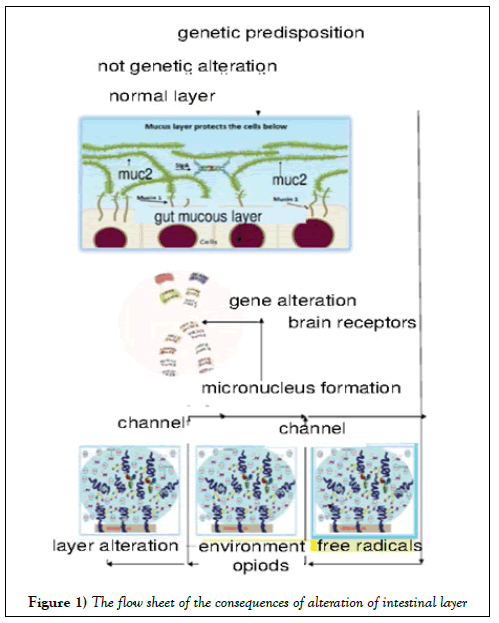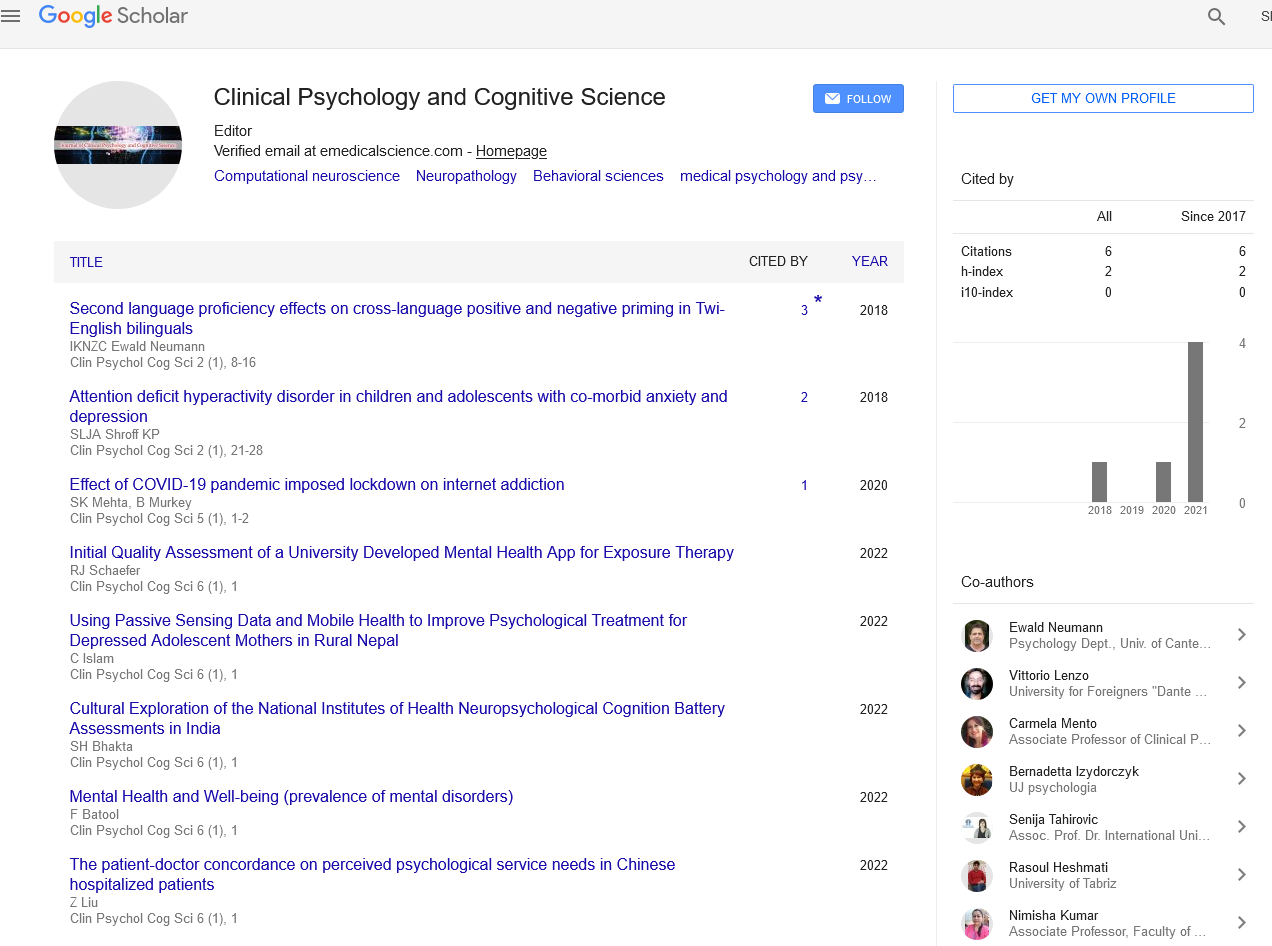An innovative proposal for the study of some aspects of the autism
Received: 27-Oct-2017 Accepted Date: Oct 31, 2017; Published: 08-Nov-2017
Citation: Roberto M. An innovative proposal for the study of some aspects of the autism. Clin Psychol Cog Sci 2017;1(1):2-3.
This open-access article is distributed under the terms of the Creative Commons Attribution Non-Commercial License (CC BY-NC) (http://creativecommons.org/licenses/by-nc/4.0/), which permits reuse, distribution and reproduction of the article, provided that the original work is properly cited and the reuse is restricted to noncommercial purposes. For commercial reuse, contact reprints@pulsus.com
Editorial
The intestinal epithelium represents the widest interface of the whole organism with the outside world and is equipped with powerful and sophisticated mechanisms to help absorb nutrients and block the entry of potentially harmful substances. Fundamental is the integrity of the intestinal epithelium to maintain a health condition. An alteration or malfunction of this organ can cause malabsorption of essential elements, with relative organic deficiency, reabsorption of toxic substances due to food waste, development, proliferation and potential invasion by pathogenic bacteria, weakening of the immune system [1-4].
The microbial ecosystem, is strongly dependent, to the integrity of intestinal mucosal layer, because the same layer is varying qualitatively, depending on the areas of the intestinal tract, and changes in relation of the age, and is submitted, by the influence of environmental factors, such as: incorrect food habits. This last factor may produce a dramatically alteration of mucous integrity layer, with a loss of adsorption and metabolic functions, when exist a genetic predisposition. Recent researches on microbiomas have shown that the influence of these bad habits in presence of particular genetic syndromes extends far beyond the gastrointestinal tract by playing an important role in the development and functioning of the central nervous system. In fact, the microbial function, among other things, functions both as recognition and synthesis of neuroendocrine hormones and produces neuroactive factors, capable of communicating not only with the enteric nervous system but also with the central nervous system. Indeed, it has now been established that neurotransmitters such as serotonin, dopamine, noradrenaline, acetylcholine etc. are among the substances produced by the bacteria, of which the microorganisms possess the relative receptors.
The aim of my studies is to study the possible alterations of the mucins that play a fundamental role in the formation and proper functioning of the intestinal barrier. We are studying this process in relation to the presence of symptoms present in autism and which may be related to proper alteration of intestinal permeability. I refer to the phenomenon of so-called opioids likepeptides. In recent studies it shows that some opioid peptides, as the betacasomorphin- 7, pass through the encephalic barrier, binding to receptors, and inhibiting the normal neuronal transmitter’s reuptake. The phenomenon of the alteration of the intestinal permeability is always associated with the change in the intestinal mucin expression, and with the increasing of the concentration of MUC2 (gel forming). The same phenomenon occurs in the oral mucosa, when is present the diabetes; there is an increasing of the excreted mucins, MUC7 and MUC5B, with a modification of the Spinnbarkeit, the parametric value of mucosal adhesion, with changing its normal continuous layer, in a succession of bubbles, separated by channels. So, for the similar properties, of MUC2 with MUC5B, and MUC7, the alteration of intestinal mucosal layer, may facilitating the cycle of the opioid peptides and the free radicals formation (Figure 1).
In autism the presence of a modification of normal intestinal mucous layer, in the case involves, with a complex feed-back mechanism, a stream of biochemical compounds that further alter central nervous structures. It is possible restoring the conditions that are, underlying the intestinal permeability, and inhibit the reuptake of opioid with hyperforin [5-7].
REFERENCES
- Lázaro CP, Pondé MP, Rodrigues LE. Opioid peptides and gastrointestinal symptoms in autism spectrum disorders. Rev Bras Psiquiatr 2016;38(3):243-6.
- Rosenfeld CS. Microbiome disturbances and autism spectrum disorders. Drug Metab Dispos 2015;43(10):1557-71.
- Plaisancié P, Boutrou R, Estienne M, et al. ß-Casein (94-123)-derived peptides differently modulate production of mucins in intestinal goblet cells. J Dairy Res 2015;82(1):36-46.
- Plaisancié P, Claustre J, Estienne M, et al. A novel bioactive peptide from yoghurts modulates expression of the gel-forming MUC2 mucin as well as population of goblet cells and Paneth cells along the small intestine. J Nutr Biochem 2013;24(1):213-21.
- Main PA, Thomas P, Angley MT, et al. Lack of evidence for genomic instability in autistic children as measured by the cytokinesis-block micronucleus cytome assay. Autism Res 2015;8(1):94-104.
- Main PA, Thomas P, Esterman A, et al. Necrosis is increased in lymphoblastoid cell lines from children with autism compared with their non-autistic siblings under conditions of oxidative and nitrosative stress. Mutagenesis 2013;28(4):475-84.
- Frye RE, James SJ. Metabolic pathology of autism in relation to redox metabolism. Biomark Med 2014;8(3):321-30.






